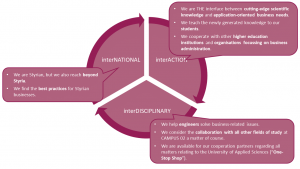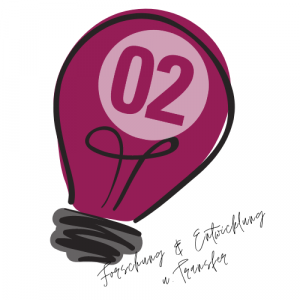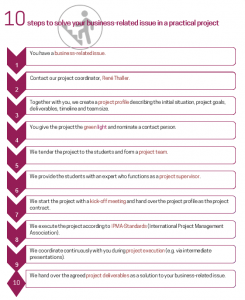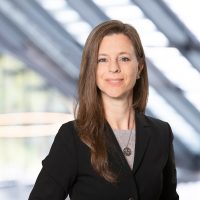Research, Development and Transfer
In the Degree Programmes in Financial Accounting & Management Accounting, we orient ourselves in all research, development and transfer activities using the three perspectives in our mission statement:
Our expertise for you!
In our degree programmes, we regularly evaluate what the economy needs and focus our research and development activities in the following areas:
The megatrend of digitalisation means that accounting and controlling are facing new challenges. However, the trend also offers opportunities that need to be grasped.
Digitalisation is resulting in the automation of entire billing processes and is accompanied by fundamental changes in organisations, processes and business models. The threats posed by cybercrime are also increasing. The costs and benefits of digitalisation also need to be subjected to a comprehensive analysis along with the consequences for IT security, the internal check system (IKS), risk management and for process and knowledge management.
The classical management loop of goal definition, planning, control and reporting will continue to exist. However, the potential benefit of digitalisation for company needs to be unleashed.
The handling of the exponentially rising volume of data (Big Data) in particular will become a success factor. Company-specific solutions need to be developed for a Controlling 4.0 approach. Small and medium enterprises must be able to focus their analyses on relevant information from internal and external data sources in order to be able to make well-founded decisions. The gap between practical application, comprehensibility and sufficient academic and theoretical background needs to be closed.
It is also necessary to investigate how the requirements profile for controllers is changing due to digitalisation in order to guarantee that, when transferred into teaching, the build-up of student competence is in line with business needs.
In terms of the central R&D digitalisation strategy at CAMPUS 02, this focus is allocated to the fields “Digital SME on a Company Level” and “Digital Internal Processes in SMEs”.
Corporate Social Responsibility describes the voluntary contribution by the economy to a sustainable development that goes beyond legal requirements. Apart from ecological and economic dimensions, long-term company management includes social components and requires corresponding action by the company. This covers all areas of business activity, beginning with the classic business fields of value creation, procurement, production and sales up to organisation, accounting and controlling.
One goal of this focus is the conceptual development of practical sustainability models for companies. The simple development and integration of instruments is, however, not sufficient. In order to be able to guarantee these sustainability measures, they need to be directly linked to the core business of the company in question. This requires the detailed analysis of the company’s units, targets and strategies. One possibility to guarantee the integration of sustainable company management and the execution of operative sustainability decisions is to implement “Sustainability Controlling”. This generates data and performance is analysed using the three dimensions of sustainability.
Sustainability reporting communicates the performance to the stakeholders and is thus part of a successful communication strategy. This field is experiencing increased interest as changes to legislation on both national and international levels are requiring companies to open their books regarding their engagement in environmental, social and worker-related aspects in the form of non-financial reports.
A further field of activity regarding this focus is the empirical analysis of economic effects. The relevance of projects, events and other activities that increase the demand for goods and services is analysed objectively based on data using established macro-economic value creation models. Examples of questions are:
- … Which regional economic effects result from an investment project?
- … result from changes in the tax and transfer systems?
- … result from sport and cultural events?
- … result from tourist activities and projects?
- … are generated by sport and cultural associations?
Regional economic effects are defined here as effects on the regional value chain, regional employment, regional income, taxes and duties. Direct, indirect and induced effects are quantified.
How can we help you?
We create tailored solutions for your business-related questions based on the latest academic insights. We define ourselves via two important principles: Quality and Applicability.
Please contact us to determine what the optimum form of cooperation for you is. We are looking forward to accompanying you from the initial idea to the successful implementation of the project!
Practical projects
Students work on your concrete questions in practical projects together with the lecturer.
Download: 10 steps to solve your business-related question.
Work Placement
Our students have to complete a work placement in the 6th semester of the Bachelor’s degree programme. The work placement must last at least 12 weeks from January to June (at least 30 hours per week).
If you are interested in employing an intern, please send us a brief work placement description —we will publish it on our platform. The students will then apply directly to you.
Your advantages as a cooperation partner in a practical project
- You will be provided with student resources for the duration of the project.
- An expert works as a project supervisor. This provides your company with professional input.
- The mix of professional experiences of the participants provides interesting perspectives for your specific topic.
- Some of our cooperation partners incorporate our projects into their employer branding to reach students as future employees.
- As a university of applied sciences, we constantly receive up-to-date insights into the business world. This enables us to adapt our curricula to the changing requirements of the economy. In this way, we ensure that our education is in line with demand – for you as well.
Scientific Work
Our goal is to publish Bachelor’s and Master’s theses with a high degree of practical relevance. Our future graduates produce concrete results for you and prove their competence in scientific working. The students are supervised during the entire process by an expert from our degree programmes.
Find more general information on CAMPUS 02’s R&D services here.





